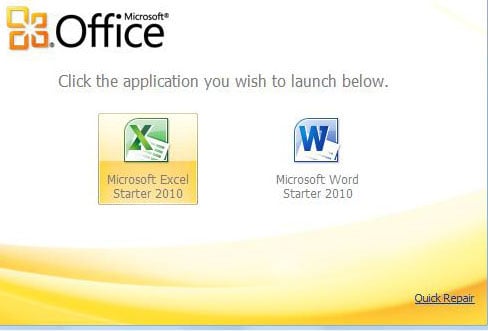Microsoft Office 2010 Starter Replaces Works, Adds Advertising
Microsoft launched the latest version of Office today, with a new series of features and capabilities, including an entirely new basic flavor (dubbed Office 2010 Starter Edition) that replaces the long-reviled Microsoft Works. The chief advantage to the switch, from a consumer's perspective, is that it eliminates the hassle of dealing with Works' antiquated interface or separate file types. Unfortunately, there are also some disadvantages to the new version.
As its name implies, Office Starter Edition is an extremely limited version of the standard Office suite. Only two applications—Word and Excel—are included in the bundle and neither are full versions. The following features are unavailable in Office 2010 Starter:

In theory, Office Starter is advertising-supported, but Microsoft is apparently concerned enough about the status of its cash cow that it doesn't want consumers thinking they can actually get a free version of Office in exchange for not clicking on some ads. The company also isn't above using Office Starter to shill for some of its other products; the software package is available for $2 to OEMs if they agree to preload the Bing Bar and Windows Live Essentials, or $5 if they won't.
As its name implies, Office Starter Edition is an extremely limited version of the standard Office suite. Only two applications—Word and Excel—are included in the bundle and neither are full versions. The following features are unavailable in Office 2010 Starter:
- Customizable ribbon and customizable quick access toolbar buttons
- SmartArt
- Math and equation editing
- Full screen reading view
- Reference features (Citation, Bibliography etc)
- Tracked changes and comments
- Compare and combining documents
- Document permissions and protection
- Automatic table of contents
- Macros
- Addins
- Pivot tables and pivot charts in Excel Starter
- Any additional custom commands not exposed in the ribbon

In theory, Office Starter is advertising-supported, but Microsoft is apparently concerned enough about the status of its cash cow that it doesn't want consumers thinking they can actually get a free version of Office in exchange for not clicking on some ads. The company also isn't above using Office Starter to shill for some of its other products; the software package is available for $2 to OEMs if they agree to preload the Bing Bar and Windows Live Essentials, or $5 if they won't.

